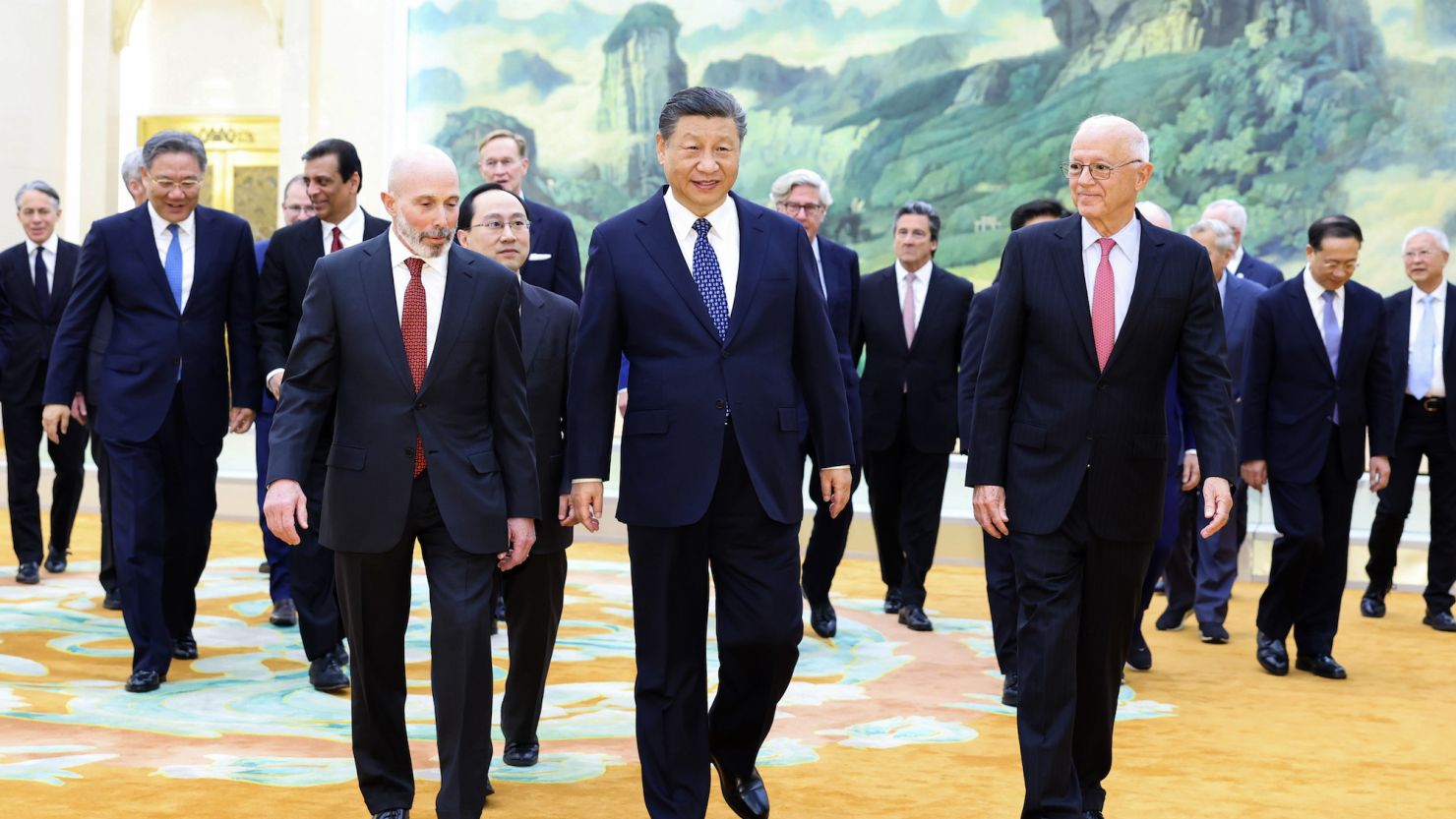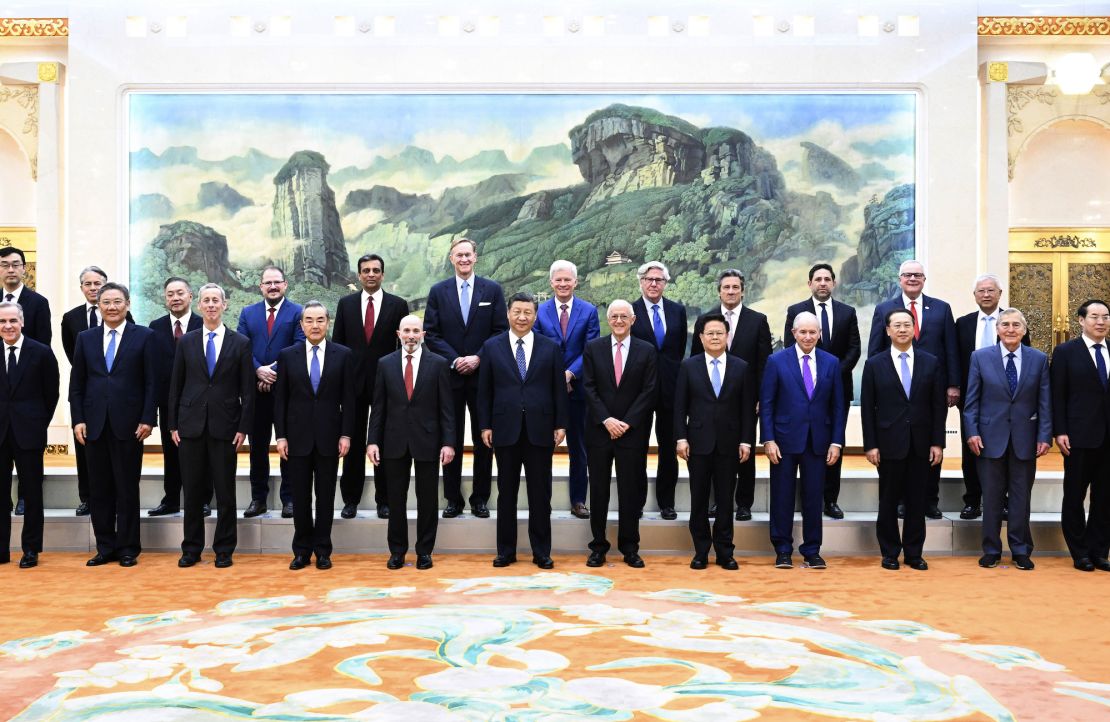
In Short
- President xi jinping of china met with us academics and ceos to improve relations and attract investors.
- China faces economic challenges, including declining foreign direct investment.
TFD – Dive into the diplomatic interactions between China and the US as President Xi Jinping engages with prominent US figures to bolster ties and attract investments amid economic uncertainties.
On Wednesday, Chinese President Xi Jinping held meetings with over a dozen US academics and CEOs as Beijing stepped up its efforts to win back international investors and improve tense ties with the US.
The world’s second-biggest economy, China, has seen a decline in foreign direct investment in recent months due to a number of factors including slower growth, regulatory crackdowns, burdensome national security laws, and concerns about the country’s long-term prospects.
Among the CEOs in attendance were Stephen Schwarzman of the Blackstone Group (BX), Raj Subramaniam of FedEx (FDX), and Cristiano Amon of Qualcomm (QCOM).
Xi invited US businesses to “continue to invest in China” and pledged further reforms to open the country’s markets to foreign firms, according to a readout of the meeting published by the foreign ministry.
He stated that the economy of China has not yet reached its top and that “we have the confidence” in the country’s growth potential.
Additionally, Xi urged “a better future” for the US and China. “China and the United States should help boost each other’s development, whether it is in traditional fields like economy, trade, and agriculture or emerging fields like climate change and artificial intelligence,” he stated.
Xi continued, “Since he met with US President Joe Biden in San Francisco in November, bilateral relations have already shown improvement.”
Chinese official media meticulously controlled the optics of Xi’s encounter with the US visitors.
State broadcaster CCTV has footage of Xi’s American guests attentively taking notes and nodding along with the Chinese leader as he speaks. In the meantime, images from the state-run news agency Xinhua show the US participants lining up on the red carpet behind Xi in unison.
Not a single woman can be found in the lineup of American CEOs and academics in a startling group shot that was taken before to the conference, raising further concerns about who was left out.

Sheena Chestnut Greitens, an associate professor of public affairs at the University of Texas-Austin, posted on social platform X, saying, “These appear to be senior visitors attending the China Development Forum, but the lack of gender/ethnic/age diversity is pretty glaring – and unrepresentative of the true range of expertise or policy perspective on China in the US.”
The Great Hall of the People in Beijing hosted a gathering following the conclusion of a significant government conference that has long allowed executives from around the world’s corporate community to interact with Chinese officials.
This week’s annual China Development Forum was held in the Chinese capital, bringing together over 100 CEOs from across the world and the leaders of global institutions including the World Bank and the International Monetary Fund. US executives make up over thirty of them, Chinese official media reports.
Beijing is attempting to restore confidence as the nation deals with its greatest economic challenges in decades and stabilize international investment and trade. Since last year, it has implemented a number of policies, including as the 24-point action plan the cabinet unveiled earlier this month, to increase market access and draw in foreign investment in high-tech industries.
However, both a structural downturn and China’s increased monitoring of Western businesses continue to spook international investors.
The Commerce Ministry said that slump followed an 8% decrease in 2023.
Data from the State Administration of Foreign Exchange revealed that in 2023, direct investment liabilities, another measure of FDI, fell by 82%. In thirty years, it was the lowest.
A survey conducted last month by the American Chamber of Commerce in China found that 57% of US businesses were not confident that China will continue to open up its markets to international businesses.
Similar to previous year, China has set a target for economic growth this year of about 5%. However, market observers claim that the objective is “ambitious,” considering that the central government has not implemented any significant stimulus plans to directly address the low confidence and reluctance to spend among Chinese consumers.
Numerous issues beset the second largest economy in the world. These include a protracted real estate market slump, debt, deflation, population declines, and a change in economic policy toward ideological goals that has alarmed international investors and unsettled the private sector.
Nectar Gan of CNN provided more reporting.
Conclusion
President Xi Jinping’s efforts to engage with US leaders reflect China’s aim to stabilize international investments amidst economic challenges, highlighting the importance of diplomatic relations for global economic stability.
Connect with us for the Latest, Current, and Breaking News news updates and videos from thefoxdaily.com. The most recent news in the United States, around the world , in business, opinion, technology, politics, and sports, follow Thefoxdaily on X, Facebook, and Instagram .
